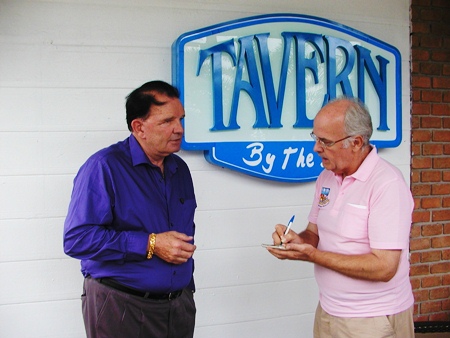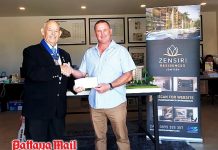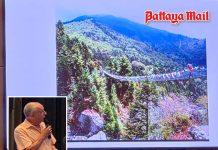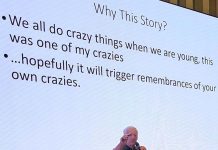Master of Ceremonies “Hawaii” Bob Sutterfield welcomed everyone to the regular Sunday meeting of the Pattaya City Expats Club at Tavern by the Sea on December 5, 2010. After the usual opening announcements, he called on fellow member Harry “Sig” Sigworth to introduce the Club’s guest speaker, John Ryan.
Sig pointed out that John has a 40 year background not only in the field of detection of deception, but also in other training for law enforcement and intelligence agencies. John has taught SWAT teams all over the world encompassing 20 countries as well as training them in modern techniques of interrogation, primarily to detect when a subject is being deceptive in their answers. He has received many commendations from law enforcement agencies around the world and holds honorary positions with a large number them. John is the only Australian ever to qualify as an Instructor in the USA for Voice Analysis and is currently the Director of Training and Research for the International Truth Verification Technologies Institute of Perth, Western Australia. Their website is at: http://www.itvt.org/
 PCEC Member Roger (right) gets a few more critical details from Lt Col. John Ryan (left), director of Training and Research for the International Truth Verification Technologies Institute of Australia.
PCEC Member Roger (right) gets a few more critical details from Lt Col. John Ryan (left), director of Training and Research for the International Truth Verification Technologies Institute of Australia.
John began his presentation by stating that there is no such thing as a lie detector. John explained this remark by giving a brief history of the development of the polygraph machine, which has been used for many years, but is not infallible as results of a polygraph test can be unreliable or inconclusive. He also described the early use of another technique now in vogue called voice stress analysis; this technique was initially started in 1970 by three retired Intelligence Officers when they came up with their Psychological Stress Evaluator (PSE). He mentioned that these types of analyses were originally based on analog signals, but many have now been digitized since the early 1990s. However, they still suffer from underdevelopment and can have, as with the polygraph, unreliable or inconclusive results.
International Truth Verification Technologies Institute has developed what John describes as the Forensic Voice Stress Analyzer (FVSA ©) that uses 21st century technology. It was launched in 2006 after much research and is vastly more improved than the old technology. Initially, ITVTI went to a world class scientific instrument maker in Perth, Australia to produce a modern complicated mathematical algorithm. They then passed that on to a PhD graduate of Curtin University, Western Australia, to develop the software programming. The result was a 21st century filtering and algorithm program that is compatible with all computer systems.
The device captures and filters utterances then displays a graphic result instantly on a computer screen. John says language has no bearing on the outcome as the device captures frequency produced by subconscious physiological reaction in the body to relevant questions. John explained that when a subject senses that a truthful answer could lead to unwanted consequences such as punishment or jeopardy, the body subconsciously reacts and gives off minute frequency changes from various parts of the body. The FVSA can detect and display this reaction in graphical form instantaneously.
He said they have used it in Brunei, Australia, Columbia, Malaysia, Thailand, USA, and most recently in India, Vietnam, and Singapore. Further, he said there have been no inconclusive results since its inception. The device can be used for testing in many areas such as cold case interviews, pre-employment checks, due diligence matters, evaluating integrity, and conducting investigations.
John noted that it is an investigator’s tool rather than a tool for prosecution. When the subject is shown to be untruthful, it can lead the investigator into appropriate avenues of investigation. As an example, he showed how the device could be used by Customs at a port of entry. By asking about 3 relevant questions that take only minutes, the FVSA can show whether the answers are truthful or deceptive. If deceptive, then additional examination can be made.
In concluding his presentation, John called on a couple of unsuspecting Club members to help him demonstrate how the device works by asking them to answer a specific question first with an untruthful answer and then a truthful one, displaying the results on the big screen. John then answered several questions from the audience.
“Hawaii” Bob updated everyone on upcoming events in and around Pattaya and called on Bob L’Etoile and Sig to conduct the always informative and sometimes humorous Open Forum, where questions about living in Thailand and Pattaya in particular are asked and answered.




